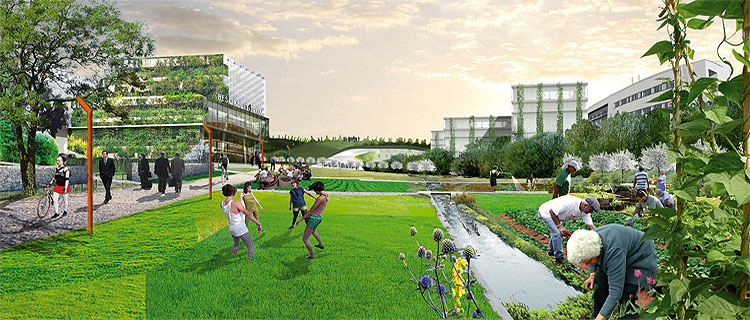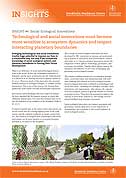Insight #4 Social-ecological innovations

Technological and social innovations must become more sensitive to ecosystem dynamics and respect interacting planetary boundaries.
Emerging technological and social innovations involve huge potential to improve our lives in a sustainable way, but only if we incorporate knowledge of social-ecological systems and planetary boundaries in framing their future development.
The concept of social-ecological innovation has been developed by centre researchers to increase our understanding of patterns in innovation and transformation (Olsson and Galaz 2011).
Social-ecological innovation is defined as technological and social innovation - including new strategies, concepts, ideas, institutions, and organizations - that enhance the capacity of social-ecological systems to generate bundles of essential ecosystem services. These have the potential to improve the capacity to learn from, respond to, and manage environmental feedback from dynamic ecosystems.
Key findings
1. Information and communications technology has an untapped potential to improve new models of governance and management of social-ecological systems.
2. Emergence and diffusion of new governance modes can reconnect institutions and social-ecological dynamics.
3. Governments around the Baltic Sea have agreed on a unique social-ecological innovation for managing transboundary pollution.
4. Substantial national investments for monitoring, control and enforcement technology have improved the governance of vulnerable marine resources in the Southern Ocean.
5. Small-scale water system innovations in sub-Saharan Africa have increased productivity and multi-functionality at landscape level.
6. The ability to seize windows of opportunity and coordinate innovation processes across scales is of crucial importance to release lock-ins and enable shifts into new trajectories.
7. Shadow networks and institutional entrepreneurs are key to designing and developing experiments and promoting innovation.
8. Experiments and “beta testing" of policy options are important when preparing for a transformation that can be implemented when an opportunity comes along.
9. There is a growing need for integrated global governance for resolving conflicts and facilitating coordination in institutionally fragmented settings.
10. Innovations in urban planning have the potential to increase flows and management of ecosystem services.
11. Disturbances and crises can create opportunities for innovations that cause radical shifts and transformations in social-ecological systems.








